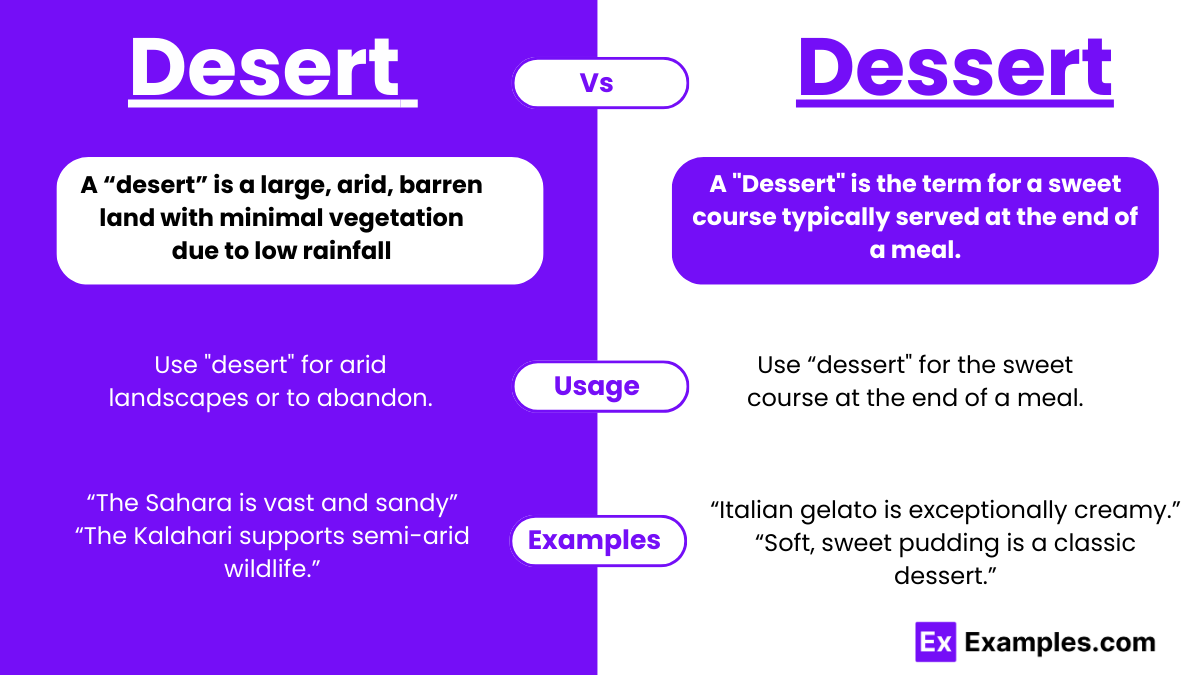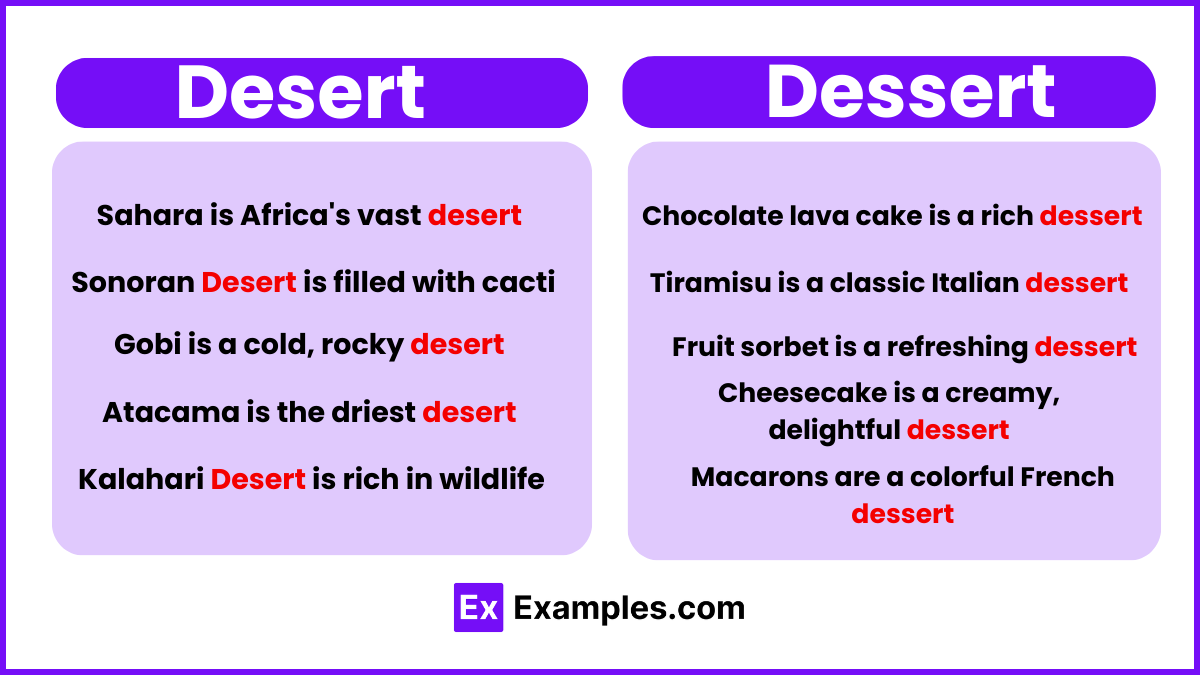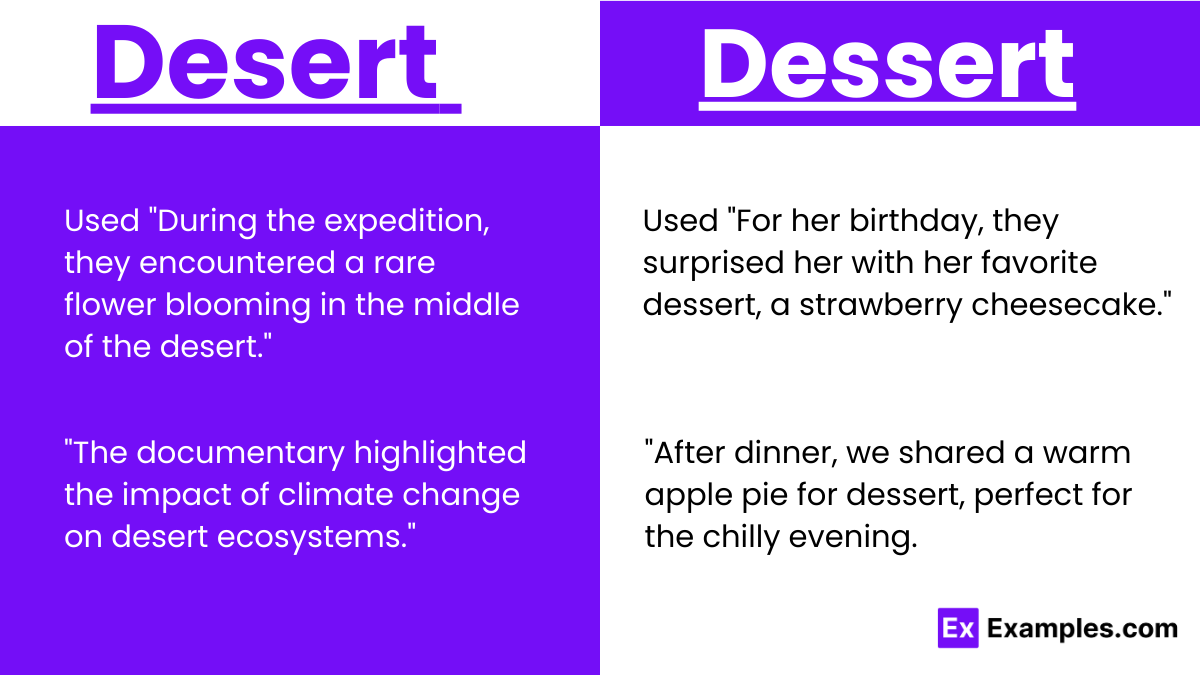Desert vs Dessert – Examples, Differences, Usage
Embark on a linguistic adventure with our complete guide to “Desert vs Dessert.” These words, often confused, hold vastly different meanings. A “desert” conjures images of vast, arid landscapes, while “dessert” evokes sweet treats enjoyed after a meal. Our guide, brimming with examples, demystifies these terms, ensuring you’ll never mix them up again. Dive into the nuances of these words, from sandy expanses to decadent delights, and enrich your vocabulary with precision and sweetness.
Desert and Dessert – Meanings
Understanding the distinction between “Desert” and “Dessert” is essential for mastering English vocabulary. These two words, while similar in spelling, have vastly different meanings and are used in different contexts.
Desert: “Desert” refers to a large, dry, barren area of land, often sandy, with little to no vegetation due to its lack of rainfall.It’s used in contexts related to geography and climate. For example, “The Sahara is the largest hot desert in the world,” or “Many cacti have adapted to survive in the desert.”
Dessert: “Dessert” is the term for a sweet course typically served at the end of a meal. It encompasses a wide variety of sweet treats, from cakes and cookies to ice cream and pastries. For example, “For dessert, we had chocolate cake,” or “She made a delicious fruit pie for dessert.”
The proper use of “Desert” and “Dessert” is crucial for clear and accurate communication. This distinction not only prevents confusion but also enriches one’s vocabulary, enhancing both the clarity and sophistication of one’s writing and speaking in English.
Summary
Understanding the difference between “Desert” and “Dessert” is essential for clear communication. “Desert,” a noun, refers to a vast, arid landscape with minimal vegetation, known for its extreme conditions. Conversely, “Dessert” denotes the sweet course typically served at the end of a meal, such as cakes, pies, or ice cream. While their spellings are similar, differing by only one letter, their meanings and contexts are worlds apart—one represents a challenging environment, and the other, a delightful culinary experience
How To Pronounce Desert and Dessert
Pronouncing English words correctly can sometimes be tricky, especially with words as closely related as “desert” and “dessert.” Here’s a breakdown to help differentiate the two:
Desert (as in a barren area of land)
- Pronunciation: /ˈdez.ərt/
- Phonetic Cue: Think of the first syllable sounding like “dez,” rhyming with “fez.” The emphasis is on the first syllable.
Desert (as in to abandon)
- Pronunciation: /dɪˈzɜːrt/
- Phonetic Cue: This shares the same spelling as the barren land but is pronounced differently when it means to abandon someone or something. The emphasis shifts to the second syllable, sounding more like “di-ZURT,” where “ZURT” rhymes with “hurt.”
Dessert (as in the sweet course eaten at the end of a meal)
- Pronunciation: /dɪˈzɜːrt/
- Phonetic Cue: Similar to the second pronunciation of “desert” (to abandon), but it’s used for the context of food. Think of the emphasis being on the second syllable, “di-ZERT,” where “ZERT” rhymes with “shirt.”
To remember the difference, a common mnemonic is that “dessert” (the sweet treat) has one more “s” than “desert” (the barren land or to abandon) because you always want more of the sweet stuff.
Understanding where the stress lies in each word can greatly help in distinguishing them in speech. The emphasis is key: “DES-ert” for the barren landscape or “de-SERT” for abandonment, and “de-ZERT” for the sweet treat
Difference Between Desert and Dessert
| Feature | Desert | Dessert |
|---|---|---|
| Definition | A vast, barren landscape with scarce vegetation and precipitation, known for extreme conditions. | A sweet course usually served at the end of a meal, including cakes, cookies, or ice cream. |
| Pronunciation | DEH-zert (Emphasis on the first syllable) | dih-ZURT (Emphasis on the second syllable) |
| Usage | Refers to a type of ecosystem or to abandon (as in “to desert”). | Refers to the sweet part of a meal. |
| Context | Environmental, geographical, military. | Culinary, gastronomical. |
| Examples | Sahara Desert, people deserting a place. | Chocolate cake, apple pie, ice cream |
Desert and Dessert – Examples
Desert Examples
- The desert was so vast that you could see nothing but sand dunes for miles.
- At night, the desert cooled down rapidly, contrasting the day’s heat.
- Many animals have adapted to survive the harsh desert climate.
- The desert landscape changed color at sunset, creating a breathtaking view.
- Exploring the desert, we found ancient fossils buried in the sand.
Dessert Examples
- After dinner, we were excited to see what the dessert would be.
- Her favorite dessert was strawberry cheesecake, which she made for special occasions.
- The dessert menu featured exotic options like mango sticky rice.
- For a light dessert, they served fruit salad with a honey drizzle.
- The chocolate fountain was the highlight of the dessert buffet.
Synonyms for Desert
| Desert (Landform) | Dessert (Food) |
|---|---|
| Arid region | Sweet treat |
| Wasteland | Confectionery |
| Wilderness | Pudding (in the UK) |
| Barren land | After-dinner sweet |
| Sand dunes | Pastry |
When to Use “Desert and Dessert”
When to Use “Desert”:
- Geographical Context: Use “desert” when referring to a vast, arid landscape with sparse vegetation. It’s applicable in discussions about geography, climate, or the natural environment.
- Abandonment: “Desert” as a verb means to abandon or leave without permission. It’s used in contexts involving leaving a place, a group, or failing to fulfill obligations.
When to Use “Dessert”:
- Culinary Context: Use “dessert” when talking about the sweet course typically served at the end of a meal. This includes cakes, cookies, ice cream, and other sweet treats.
- Celebratory or Special Occasions: Dessert is often associated with celebrations, special meals, or as a treat. It can symbolize indulgence or a festive conclusion to dining.
How to Use “Desert”
- As a Noun: “Desert” refers to a large, dry, barren area of land with little to no vegetation, typically due to low rainfall.
- Example: “The Mojave Desert is known for its extreme temperatures and unique wildlife.”
- As a Verb: “Desert” means to abandon someone or something, often in a way that is considered disloyal or treacherous.
- Example: “He deserted his friends when they needed him the most.”
How to Use “Dessert”
- As a Noun: “Dessert” is the sweet course usually served at the end of a meal. It can include items like cakes, cookies, ice cream, or fruit.
- Example: “For dessert, we’re having chocolate cake with raspberry sauce.”
Tips for Remembering the Difference
- Spelling Cue: “Dessert” has an extra “s” because you always want more of something sweet. Remember, “ss” in “dessert” for something “sweet and special.”
- Context Clue: “Desert” as a noun is about dry land, and as a verb, it involves leaving. If what you’re discussing doesn’t fit these meanings, you likely mean “dessert.”
- Count the S’s: Remember that “dessert” (the sweet treat) has two S’s because you usually want seconds. In contrast, “desert” (the arid land) has only one S.
- Use a Mnemonic: Think of the phrase “Sandy Desert” to remember that “desert” with one S is the sandy, barren place. For “dessert,” imagine “Sweet Second Serving” to help remember the extra S and its meaning.
- Associate with Context: Connect “desert” with arid and dry contexts, such as cacti or camels. For “dessert,” associate it with sweet, happy endings to meals, like cake or ice cream.
- Practice with Sentences: Make up sentences that clearly distinguish the two, such as “I wouldn’t survive a day in the desert” versus “I always save room for dessert.”
- Visual Imagery: Visualize a vast, empty desert landscape when you think of “desert.” For “dessert,” imagine a colorful, enticing plate of your favorite sweet treat. The visual contrast can reinforce the spelling difference
Exercise Problems
Fill in the blank with the correct form of “Desert and Dessert”:
- The Sahara is the largest hot __________ in the world.
- After dinner, everyone was excited to see what the __________ would be.
- Due to lack of water, many animals have uniquely adapted to survive in the __________.
- She decided to bake a __________ for the party, choosing a classic chocolate cake recipe.
- During the military conflict, some soldiers chose to __________ their posts, facing severe consequences later.
- For a summer treat, nothing beats a cold __________, especially when it’s homemade ice cream.
- The __________ landscape can be both beautiful and harsh, offering stunning vistas but challenging living conditions.
- At the wedding, the __________ table featured an assortment of miniature pastries and fruit tarts
How do you Remember Desert vs Dessert?
To remember “desert” versus “dessert,” think: “Dessert” has two S’s because you always want seconds of something sweet, while “desert” has one S, like the solitary, sparse landscape it describes.
How are deserts formed?
Deserts form due to low rainfall over years, resulting in dry conditions unsuitable for most plant and animal life
By keeping these distinctions and tips in mind, you’ll be able to confidently use “desert” and “dessert” in their proper contexts, whether you’re talking about landscapes, acts of abandonment, or sweet treats after a meal.




